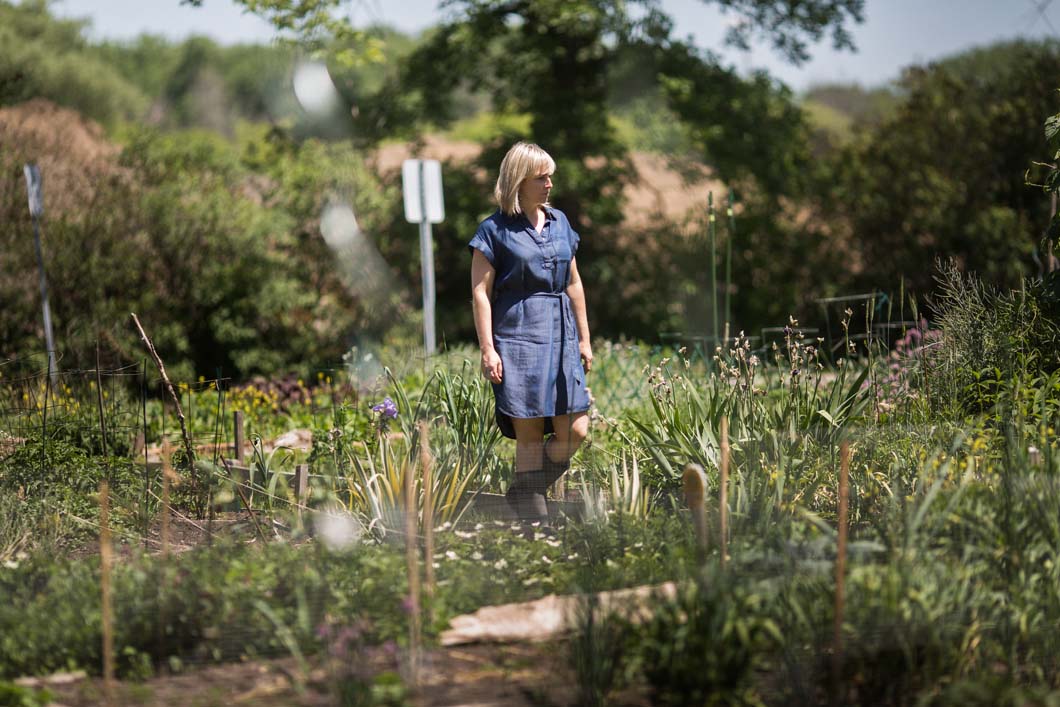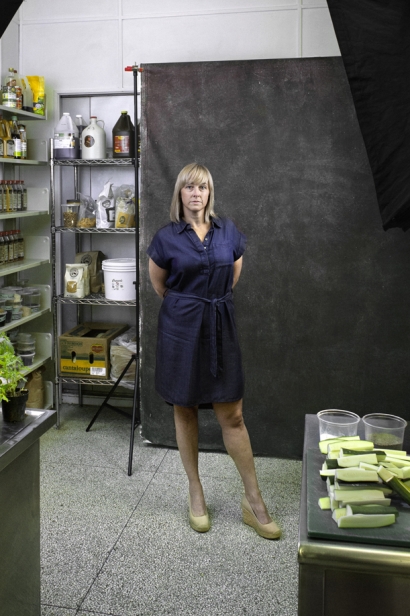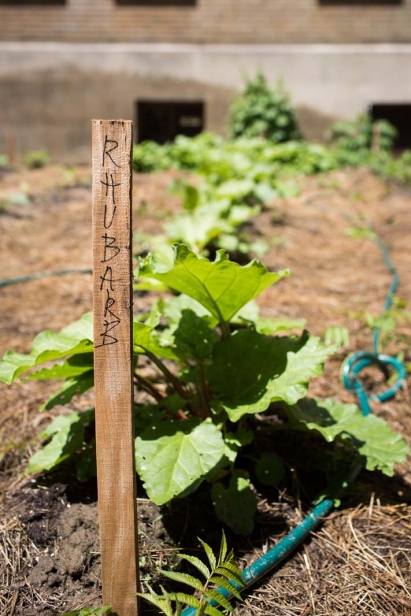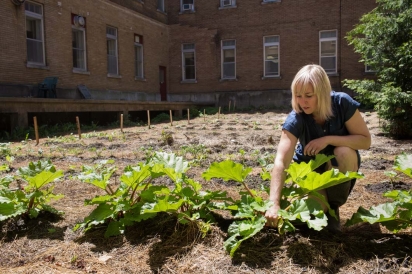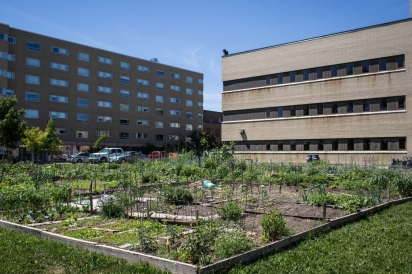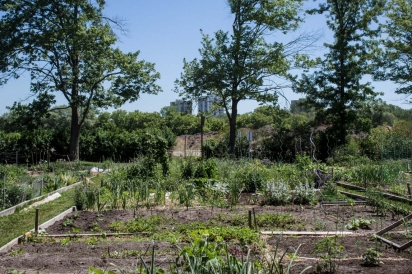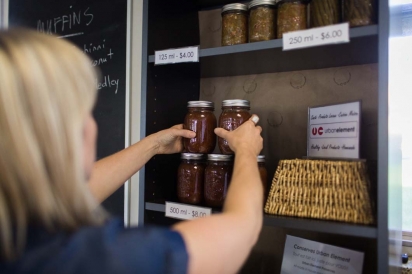The Big Picture - Carley Schelck
Few foodstuffs are as indelible as a bottle of ketchup. The audacious concoction has come a long way from its ancient origins as a fermented fish sauce from Southeast Asia to the globally consumed red dynamo it is today. A mysterious mash of tomatoes, spices and vinegar, ketchup is at once tantalizingly sweet and almost sickly savoury — an umami beast that ignites the pendulum of your palate. Ketchup (or, let’s face it, Heinz ketchup, which has dominated the market since 1876) has held a place on our plates practically since birth and has remained tucked into some corner of our refrigerators and pantries ever since. Any attempts to mimic it are futile — the world’s most famous table sauce is so heavily processed it is bears little resemblance to its native ingredients.
For Carley Schelck, the decision to hold the Heinz at the cafeteria she managed was an attempt to introduce people to the real deal — a chance to connect them to their food and actually taste the tomatoes and onions that go into ketchup. It was a bold move for any food operator, but especially in a cafeteria. It remains one of those impenetrable vestiges of cheap, processed foods; the domain of drab chicken burgers and that standard array of pitiful pap desperately in need of a jolt of flavour a squirt of the red stuff can immediately deliver.
“Our chef only put out his homemade ketchup. It essentially looked like chili sauce and tasted like a chili sauce, but the kids wouldn’t touch it. They just kept asking, “Where is it? Where is it?”
Schelck recounts the ketchup experiment and the uproar that ensued. She had been enlisted to take over a residence cafeteria as part of a pilot project with the University of Ottawa in 2014. The 40-year old entrepreneur and food educator was tasked with transforming the fuelling station into something nourishing for the ravenous teenagers. The scratch menu was a tough sell for the pizza-loving crowd and the resistance took on a feverish pitch when the Heinz was nowhere to be seen. Schelck remembers when her chef, Kris Kshonze, finally hit his wit’s end, “He said to me, ‘I will feed them whatever they want, I just want them to eat here.’”
She came up with a compromise — let the kids decide. “We put the Heinz next to our own ketchup and let them make the choice,” says Schelck, “and just as many people used the homemade sauce as the Heinz. So that was an interesting little experiment.”
It was a short-lived victory for Schelck. Her culinary team simply could not get the kids to eat the food that was growing locally and being prepared onsite for them and the project was ultimately abandoned. Defeated but not deterred, Schelck reconsidered her strategy. “Food is a touchy thing,” she conceded. "You can’t just shove your prerogative down someone’s throat.”
Schelck is no stranger to pushing food culture forward. In 2004, she and her husband, Oliver, moved to Ottawa from Toronto to launch The Urban Element, a ground-breaking and jaw-dropping event space, corporate venue and cooking school, housed in a renovated fire hall on Parkdale Avenue. Since its inception, The Urban Element has developed into a top-rate culinary institution, with celebrated local chefs at the helm of the classroom and curriculum. Schelck’s vision and mission focuses on healthy, fresh and locally grown foods that are cultivated, prepared and shared together as a community.
“We set out to be a cooking school and to bring people around the table to share food and conversation. If people left with two or three things that could change and inspire how they looked at food, what they purchased and what they ate, then we felt we were doing a good job.”
In 2013, after directing the school for almost 10 years, Schelck found herself back from maternity leave without a clear path. “I was only supposed to be off for six months, but it ended up taking me close to two years to come back,” she admits a bit sheepishly, her indefatigable work ethic getting the best of her. Schelck discovered that she had left the school and her vision in capable hands. Her team no longer required her hands-on leadership. “It gave me the opportunity to pause and reflect,” says Schelck. “I started to realize that possibilities existed outside of the walls of The Urban Element and that I whatever I did, I wanted it to be meaningful.”
At the same time a contract bid landed in Schelck’s lap: take the food services operation at the University of St. Paul — a small, picturesque campus located in Old Ottawa East neighbourhood. At first she was reluctant, the institutional foodscape was not exactly what Schelck had envisioned. “It was outside of the realm of what I thought we did. My vision was of us being boxed in a certain way,” she says.
Schelck decided to spearhead the operation that it would have to work her way. She approached the university with a threeyear plan to convert the cafeteria and catering services into a selfsustaining good food mecca. At the heart of the operation would be a hyper-local mandate, complete with on-site garden plots to support close to 50 per cent of the cafeteria’s food requirements during the growing season, ensuring the healthy, from-scratch menus would not gouge students’ pocketbooks. Schelck renamed the cafeteria Café Urban, aligning the operation with the same mandate that had defined The Urban Element and spent the next eight months immersed in studying every aspect of the business. Her concept initially faced resistance, but Schelck persevered, determined to understand the unique cultural landscape of the school and bring the campus around to her vision. “We came into this thinking that it would be a really great model to develop and take it elsewhere.”
Now well into its third year, Café Urban has obliterated any memory of the poutine and pogo era that dominated lunch trays in years past. The gardens are thriving — one in an onsite community garden and a second in the inner couryard — supply the central kitchen with ample stores for fresh meals and off-season preserves. Food wastes are absorbed back into the system, through composting and direct partnerships with local farmers. Schelck even has interest from a Vancouver-based assessment firm to quantify the success of the program.
So why didn’t the model work at the University of Ottawa? Schelck rhymes off a list of possible reasons: the residence was far from the main campus and under secure access (Café Urban is open to the public); and the university had anticipated 350 residents, but that number may have been overshot. But chances are it came down to demographics. At Saint Paul University, the average student age is 27, significantly older than the bulk of students flooding the downtown residences at the University of Ottawa, who belong to a cohort with tastebuds tending to screaming levels of sugar and salt. It made Schelck realize that this might not be her target market.
“We needed to look farther. I thought, why not start at primary schools? Start when they are super young and bring them along in the process, so by the time they are 17 and going to school, there is a recognition of certain foods on their palate.” Children have the benefit of unadulterated palates, with no notions of what they should or should not like — everything is a new experience. Schelck believes that this is where education can be most effective. “That might be the missing link,” she says. “That way, when they do taste Heinz, they’ll think, that’s something different.”
Since becoming a mother, Schelck’s vision has sharpened in focus, honing in on teaching food literacy skills to children. Building upon her extensive experience with the kids' culinary camps at The Urban Element and the university food models, Schelck has been invited to discussions at some very important tables, spending the past year engaged in seminars and conferences across Canada, meeting with key stakeholders from different communities to discuss the future of food in schools.
In 2015, Schelck attended the National School Food Conference where she rubbed elbows with several major players in the local food movement, including Moe Garahan of Just Food, Caroline Hunter of the School Breakfast Program and Caroline Webb from Sustain Ontario. The band of good-food powerhouses instantly struck a chord with one another. “I see a lot of vision in what they are doing,” says Schelck, who envisions the School Breakfast Program using food that the kids are growing them-selves. It is a lofty idea, she says, but one that holds promise if the women join forces. “At the conference, we were challenged to form coalitions to figure out how to motivate change in our cities,” says Schelck, “Often what happens is that people wind up working in silos.”
To Schelck, it simply makes sense to collaborate with organizations and individuals who want better food (and better food literacy) in our schools, but not everyone feels the same. When Schelck tried to bring a program called Growing Chefs Ontario to Ottawa, she was surprised at the resistance she faced. “I was willing to buy all the materials or make a donation to the fund, but for whatever reason, they weren’t willing to share the name.” The program is built upon the success of BC Growing Chefs, a province-wide, non-for-profit food literacy program that teams chefs with schools to teach healthy, sustainable food practices in the classroom. “They start very small, with food identification and planting seeds,” she explains, “They have an entire curriculum. It’s amazing and it’s thriving.” Even without their support, Schelck is committed to bringing something similar to Ottawa and has already started recruiting a team of local chefs to help her roll it out. “I don’t want to recreate any wheels,” Schelck admits freely, “I want to capitalize on the successes other people have had and ask, what has worked? Let’s build on that.”
Schelck’s devotion to improving how and what kids eat is unflinching — a charge, she says, was inspired by the birth of her son, Hannes, five years ago. “It took me a long time to realize that I wanted to be a mother. But that was the seed for my vision. It was the motivation to leave things better.” Schelck has even started a garden at Hannes’ school and is working with the teachers to include food literacy in their classrooms — another chink in the armour of the institutional food fortress she is intent on dismantling. She even hints at a vision for the future that stretches far beyond city limits: “I would love to roll out a food program. You know, across the board.” Displaying all the gregariousness and fearless determination of a well-oiled Bay Street executive, Schelck’s shrewd business acumen is tempered by her altruistic edge. She refuses to let old ideas and institutions stand in her way and could just be bold enough to prevail over cafeteria culture, coast to coast. Even if that means she leaves a little room for the Heinz.


